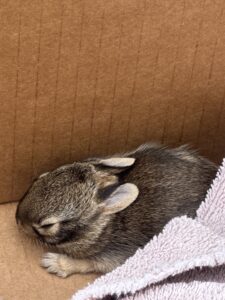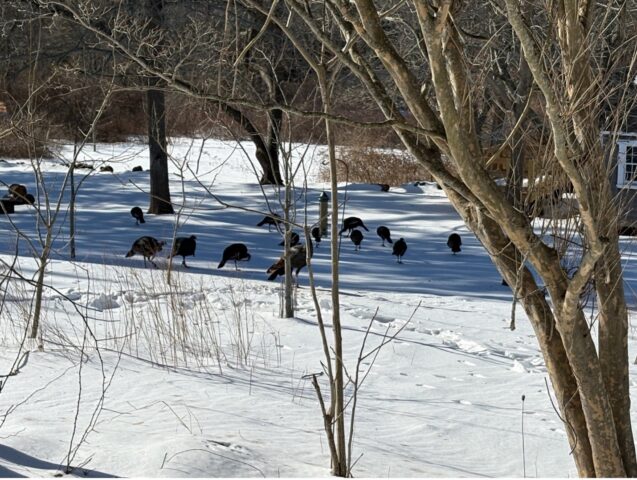On the morning of June 9, CaseyMaeve Bermingham, an educator at the Coastal Education Center, was preparing for a day of coastal Summer Camp when she discovered an abandoned juvenile bunny on the grass behind the building. After connecting with the Wildlife Clinic of Rhode Island, one of their rehabilitators Gail Bembenek, came to the rescue! This Q&A shares her insights and guidance on rehabilitating wildlife in Rhode Island.
Can you briefly share your background and what led you to start working in wildlife rehabilitation?
I graduated from Wagner College with a BA in biology, then later worked towards a masters in Biology from Harvard Extension while I was on active duty. I entered the Navy in 1978 and remained with them for 12 years and continued in the Navy reserve for another 11 years.
I had an experience when I took in injured possum. I did not know it was handicapped at the time, but later discovered it had an issue with its legs. I ended up keeping it and rehabilitating it for three years, before I discovered the Wildlife Clinic of RIU, who helped to take care of the possum when its health declined. I continued to do rehabilitation work and get certified with the Wildlife Clinic of RI, and now I can perform rehabilitations in my own home.
Have you done any other rescues recently alongside the juvenile bunny?
Yes, I will rescue and rehabilitate up to 500 bunnies in a year.
Do you have a favorite animal to work with and why?
My introduction to rehabilitation, through the Wildlife Clinic’s introductory course, was with bunnies and I enjoyed the experience so much that I never wanted to branch off with different animals. I also have experience with other small mammals such as possums and squirrels.
 Can you walk us through the rescue process and how were you able to successfully perform this rescue? How is the bunny doing now?
Can you walk us through the rescue process and how were you able to successfully perform this rescue? How is the bunny doing now?
I placed the juvenile bunny into a shoe-box sized container, making sure to use a t-shirt to make a soft bottom. It is crucial to limit excessive movement and noise, as juveniles are extremely sensitive and can decline rapidly if they are in a noisy environment, such as developing severe digestion issues and they are very susceptible to infection. Providing heat during a rescue is imperative to the bunny’s survival.
After keeping the bunny in my home for 2.5 weeks, feeding it greens to get it prepared for the diet it will have out in nature, I successfully released back into the wild on a trusted property in Saunderson, RI. This place is owned by a former songbird rehabilitator, who lets me use her property as a safe release place for her rehabilitated bunnies.
At the wildlife clinic, they typically would keep bunnies for 5-6 weeks, weaning them off of formula and onto assorted greens for up to 10 days before releasing them back out into the wild.
What signs should people look for if they think a wild animal, such as bunny, might need help?
A good indicator that there is a problem is if you see a juvenile bunny that is by itself for prolonged periods of time. This is typically an indicator that the nest has been disrupted, and the mother potentially killed by a predator. Bunnies like to build their nests in fields with tall grasses, where they can enjoy peace and quiet. However, as construction and development increase, we see more and more nests being built in residential areas, such as people’s backyards, since natural grassland habitats are declining.
How can people support wildlife rehabilitation efforts in the local area?
The Wildlife Clinic of RI deals with all native wildlife and does not turn anything away. The main facility acts as a hub, and depending on the situation, rehabilitation is either done in-house, or the animals are externally transported depending on their needs.
If you are interested in learning more about how to rehabilitate, consider checking out their subpermittee training session, where individuals holding this permit work under a fully licensed Rhode Island wildlife rehabilitator and assist with in-home care or as volunteers with the Wildlife Clinic.
Below are some resources to get in contact with the facility, as well as to donate and support their efforts statewide:
Wildlife clinic (401-294-6363)
Questions about bunnies? Reach out to Gail at 401-742-2412
Website: Wildlife Clinic of Rhode Island

